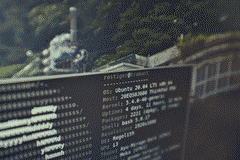Notes on the unix based operating system.
Linux is free as in freedom.
It offers users the freedom to use, adapt and develop the system in any way they please.
Freedom is a double sided sword.
While there is a plethora of tools and options to choose from, there are just as many inconsistencies between them.
Prepare for cuts.
To adapt Linux to your needs, stay willing to spend time with your operating system, stay curious, educate yourself and stay stubborn enough to persist. It gets easier over time.
I'm currently running ubuntu on my workstation trabant.
raspi
Notes on the raspberry pi.ubuntu
A flavor for LinuxWhen I switched to linux in spring 2020 I tested an array of different Linux distributions on my 2021 Macbook. The only one I could get to run reliably was Ubuntu.
I switched to a P50 ThinkPad - see rosinante - but I've stuck with Ubuntu. I use Regolith, a pre-configured conglomerate of desktop tools built on top of GNOME and i3. It focuses on keyboard driven terminal use but is versatile enough to handle most of my needs.
In 2023 I finally found someone who could fix my Macbook and I've been using it for communications and on the go - see trabant.
For a list of tools that I use, see software.
terminal
Navigating the terminalI use the gnome-terminal on trabant and rosinante.
Cheatsheet
Basic command line programs for every day use.
| cmd | Description |
| cd | change directory |
| ls | list directory content |
| pwd | print working directory |
| mv | move/rename file |
| cp | copy file |
| man | shows the manual of a program |
| lp | send file to the local printer |
| clear | clears the terminal screen |
| fg | returns to a program running in the background |
| sudo | execute command as priviledged user |
| sudo ! | execute previous command as priviledged user |
| ~ | shortcut for the home directory |
Shortcuts
These shortcuts work in bash.
| Tab | autocompletes directory and filenames |
| Alt | modifier to jump to next space |
| Ctrl+C | aborts programs by sending the SIGINT signal |
| Ctrl+Z | sends SIGSTP to move the terminal above the currently running program |
| Ctrl+L | clears the terminal screen |
| Ctrl+D | log out of the terminal and close it |
| Ctrl+A | move the cursor to the start of the line |
| Ctrl+E | move the cursor to the end of the line |
| Ctrl+U | clear the line towards the beginning |
| Ctrl+K | clear the line towards the end |
| Ctrl+W | delete last word |
| Ctrl+K | delete the rest of the line after the cursor |
Miscellaneous
Toggle the closing confirmation dialog:
gsettings set org.gnome.Terminal.Legacy.Settings confirm-close true/false
To check the setting, use:
gsettings get org.gnome.Terminal.Legacy.Settings confirm-close
utilities
Various commands.Most commands use placeholder path and file names. When using the commands replace them with the actual file paths, user and servernames.
Disk Space
df -h
Lists all partitions and their disk usage
du -hs directoryname/
Returns the total size of everything inside directoryname
sudo du -cha -d 1 /directoryname | sort -nr | head -20
Lists the size of all subdirectories of directoryname
Download Videos / Music
yt-dlp -f 'bestvideo[ext=mp4]+bestaudio[ext=m4a]/best[ext=mp4]/best'
Downloading a video in best quality
yt-dlp -x --audio-format mp3
Download audio only
yt-dlp --ignore-errors --format bestaudio --extract-audio --audio-format mp3 --audio-quality 160K --output "%(title)s.%(ext)s" --yes-playlist
Downloads a playlist as mp3
String Manipulations
sed -i "s/$OLD/$NEW/g" *.txt
Replace string in multiple files
for file in *; do mv "$file" echo $file | tr ' ' '_' | tr '[:upper:]' '[:lower:]'; done
Change all filenames to lowercase and replace all spaces with underscores in a directory:
xclip -selection clipboard -t image/png -i example.png
Copy an image to the clipboard
cat filename | grep -C 3 searchterm
Display's the content of a file searching for searchterm and displaying 3 lines of context before and after a match.
Time
date --date='TZ="Continent/City" localTZTime Date/Day'
Print local time of a date and time in a different timezone
tzselect
Find the available timezones
Miscellaneous
command | more
Paging long-scrolling output
whereis applicationname
Find the location of an application
trash-restore filename
Restoring deleted files
pdfunite file01.pdf file02.pdf output.pdf
Combine two pdfs to one
unzip /*.zip
Unzip all archived files inside directory
for f in *.zip; do unzip "$f" -d "${f%.zip}"; done
Extract all .zip files in folder creating a new director with the name of the file for each
Packages
Install .deb files
sudo dpkg --install packagename.deb
List installed dpkg packages sorted by size
dpkg-query --show --showformat='${Package;-50}\t${Installed-Size}\n' | sort -k 2 -n | grep -v deinstall | awk '{printf "%.3f MB \t %s\n", $2/(1024), $1}'
Updating python packages
python3 -m pip install --upgrade
or
pip3 install--upgrade
Clearing System Logs
journalctl --disk-usage
journalctl --rotate
sudo journalctl --vacuum-files=5
Set SystemMaxUse=100M in /etc/systemd/journald.conf to limit maximum journaling space.
Use systemctl daemon-reload to update.
For printing commands, see printer.
Add an even in khal
khal new -a "Calendar Name" 240227 17:00 18:00 Event Description
Mounting a remote filesystem with SSHFS
sshfs -o allow_other,default_permissions servername:remote/directory/path local/directory/path
Option allow_other only allowed if user_allow_other is set in /etc/fuse.conf
sudo fusermount3 -u /local/directory
Unmounts the directory
To permanently mount a remote directory, add the following line to /etc/fstab:
servername:remote/directory/path /local/directory/path fuse.sshfs noauto,x-systemd.automount,_netdev,reconnect,identityfile=/home/username/.ssh/id_rsa,allow_other,default_permissions 0 0
